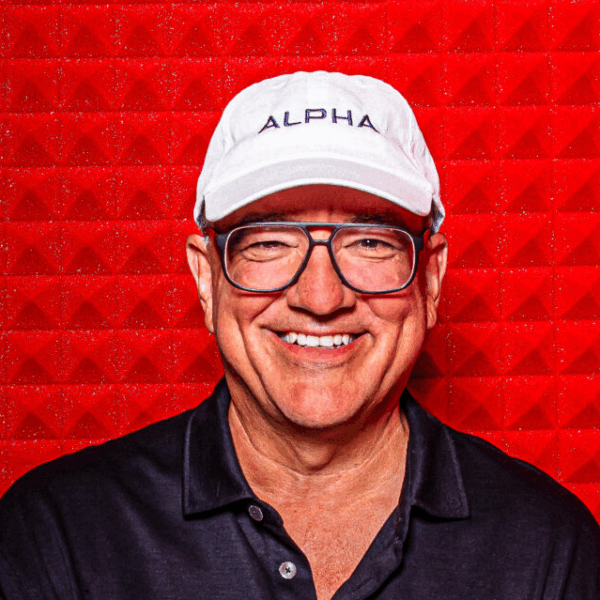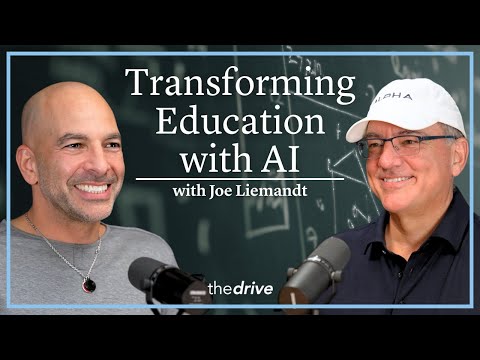Joe Liemandt is a software entrepreneur turned education reformer who left Stanford in 1989 to found Trilogy, a highly profitable private software company, before pivoting to transforming K-12 learning. In this episode, Joe shares how he transitioned from leading a global software enterprise to becoming principal of Alpha School, where his focus is building a mastery-based, individualized education model that leverages AI as the missing infrastructure for large-scale change. He details the shortcomings of traditional K-12 education, explains how Alpha replaces conventional seat time with focused academics, and outlines the role of AI tutors and human coaches in helping students accelerate through material. Joe also discusses early results, the data-driven systems that track progress, and his ambitious plan to reach a billion children in the next 20 years by combining cutting-edge technology with proven learning science.
Subscribe on: APPLE PODCASTS | SPOTIFY | RSS | OVERCAST
“My mission for The Peter Attia Drive has always been to provide you with the most rigorous, evidence-informed insights on longevity. To do that without cluttering your experience with ads, we rely entirely on our premium members. If you’d like to support the work that makes this mission possible, consider becoming a premium member.”
– Peter
We discuss:
Timestamps: There are two sets of timestamps associated with the topic list below. The first is audio (A), and the second is video (V). If you are listening to this podcast with the audio player on this page or in your favorite podcast player, please refer to the audio timestamps. If you are watching the video version on this page or YouTube, please refer to the video timestamps.
- Joe’s early interest in AI and the story of how he quit school to build Trilogy [A: 4:45, V: 1:29];
- Joe’s first encounter with Alpha School and how it sparked his journey into education innovation [A: 8:15, V: 5:59];
- America’s declining K-12 performance and the hidden power of mastering fundamentals [A: 13:00, V: 11:47];
- How traditional time-based grade progression undermines later learning, and how mastery-focused instruction can transform student achievement [A: 20:30, V: 21:00];
- Motivation as the key to high-level learning: how Alpha School fosters motivation with its “Timeback” model and leverages AI to accelerate learning [A: 28:45, V: 30:30];
- Core principles of learning: how high standards, mastery-based instruction, and supportive struggle foster both academic excellence and personal growth [A: 35:45, V: 39:00];
- Breaking down self-imposed limitations with foundational skills, defined time requirements, and a mastery model [A: 41:15, V: 45:59];
- Using short-term extrinsic rewards to help students overcome limiting beliefs and ignite lasting intrinsic motivation [A: 46:45, V: 52:35];
- $100 for 100: a simple but powerful incentive system that helps students fill academic gaps and master fundamentals [A: 53:45, V: 1:01:00];
- How AI is the pivotal technology that can finally allow proven learning science to scale and unlock unprecedented student potential [A: 57:45, V: 1:05:53];
- The emergence of generative AI that catalyzed Joe’s billion-dollar investment in education [A: 1:09:45, V: 1:19:48];
- The path and obstacles to integrating Alpha’s AI-powered model into mainstream education [A: 1:12:00, V: 1:22:21];
- Reimagining schooling from the ground up across five key dimensions [A: 1:22:30, V: 1:35:11];
- The potential of this educational approach to reduce inequality in academic success [A:1:30:00, V: 1:44:08];
- Why the biggest challenge to scaling Alpha’s AI-driven education is cultural adoption and systemic redesign [A: 1:34:00, V: 1:48:59];
- Peter’s daughter’s experience at Alpha School [A: 1:38:30, V: 1:54:30];
- Alpha School’s expansion plans and need for people and resources for maximum impact [A: 1:42:30, V: 1:58:58]; and
- More.
Show Notes
Joe’s early interest in AI and the story of how he quit school to build Trilogy [A: 4:45, V: 1:29]
People are probably wondering, how does this tie into health and medicine?
- This is a topic that’s a little bit outside of that, but really it’s not
- Where we’re ultimately going to go is education, and you can’t have a great system of health and medicine if you’re not educating kids today
- The people that are learning today are going to be the ones taking care of us, so everybody should have a vested interest in this process
- Of course, also, many people listening have kids across various spectrums of learning
- But before we get into that, Joe’s story is just so interesting
- And Peter knows that Joe doesn’t really like telling his story, because all he wants to do is talk about the work
Where did you grow up?
- Joe was born in Minnesota, and he moved around every couple years, mostly up and down the East Coast
- His dad worked for General Electric, and wherever they had a factory, whatever town , they’d moved there
You obviously did very well in high school, and you wound up at Stanford. So, what’d you major in?
- Econ
- He mostly picked it because it was easy in the Stanford curriculum
- He did not graduate; he dropped out between junior and senior year
- He would’ve been the class of 1990
- He’s sure his junior year professors were like, “He’s not really engaged, and probably misses too many classes.”
A little background on Joe before he went to Stanford
- When he was in high school, he wrote a paper on AI
- The paper was about expert systems ‒ an old school AI, not what we know today
- There was a part one paragraph called “Neural Nets,” which is sort of today’s AI, and it was like, “This is decades away.”
- Then Joe went to Stanford and literally was in a class with Professor Feigenbaum (who’s considered one of the fathers of expert systems and old school AI) and he’s just talking about how you can build these incredible systems, and they’d be worth millions of dollars if you could figure it out
Some classmates and Joe dropped out and started Trilogy ‒ it was the first AI company
- They didn’t call it AI back then because it had a bad rep
- In the 90s, they sold a billion dollars of AI products
- That’s how Joe got his start, and it eventually leads to today’s story
Peter always finds it amazing when people drop out with one year to go
- It’s like, “Why didn’t you finish it?”
- He thinks Joe must have had a strong conviction to forego his Stanford degree to go and start this company (that it can’t wait a year)
There’s a famous Forbes headline, “You’re a moron”
- Joe’s dad was very clear what a moron Joe was being by dropping out
- The issue was Joe felt there was a time to market issue, it was a race
- It’s that tension where you thought
“My market’s going to run away without me, and there’s a huge opportunity to go build this company.”‒ Joe Liemandt
- Now, with 2020 hindsight, it took them over 3 years to build a product, and they thought they could do it much quicker
- So there wasn’t a time to market issue
- And with hindsight, he could have stayed [and finished his degree at Stanford]
But back to that pressure: he just felt it, he didn’t want to miss it, he had to go do it
Did you guys come and set up shop in Austin right away?
- Not right away
- They couldn’t raise funding
- Silicon Valley back in the late 80s was not given money to dropouts like them
- But they literally lived in a garage of had classmates who had a house
- Then in ’92 they moved down to Austin
- John Lynch (who was one of the co-founders) was like, “Look, if we’re going to be poor…” (back then Austin was cheap, not like Palo Alto)
- And that’s what led them to Austin
Joe’s first encounter with Alpha School and how it sparked his journey into education innovation [A: 8:15, V: 5:59]
When did this idea of finding your second mountain (which is this passion around education) become the next frontier?
- Peter asks, “Is it David Brooks who wrote that book, The Second Mountain?”
- If your first mountain was Trilogy, this incredible business, which really we’re not going to say much more about other than the fact that it basically created an unlimited essentially war chest of capital
- That you were then able to go and deploy to your second mountain
- Which is this passion around education
You always had an interest in AI, but when did these AI in education become the next frontier?
{end of show notes preview}
Would you like access to extensive show notes and references for this podcast (and more)?
Check out this post to see an example of what the substantial show notes look like. Become a member today to get access.

Joe Liemandt
Joe Liemandt is a tech entrepreneur, best known for founding Trilogy Software and later building ESW Capital, a firm that has acquired over 100 software companies. A Stanford dropout and one of the youngest-ever Forbes 400 billionaires, Joe has turned his sights on reinventing how people learn.
He is the principal of Alpha School, a private, tech-forward learning model that condenses core academics into just two hours per day using AI-driven tutoring. This frees up time for personalized, purpose-based skill development. Joe brings an operational, systems-driven mindset to learning — prioritizing efficiency, personalization, and confidence. [Colossus]
LinkedIn: Joe Liemandt



